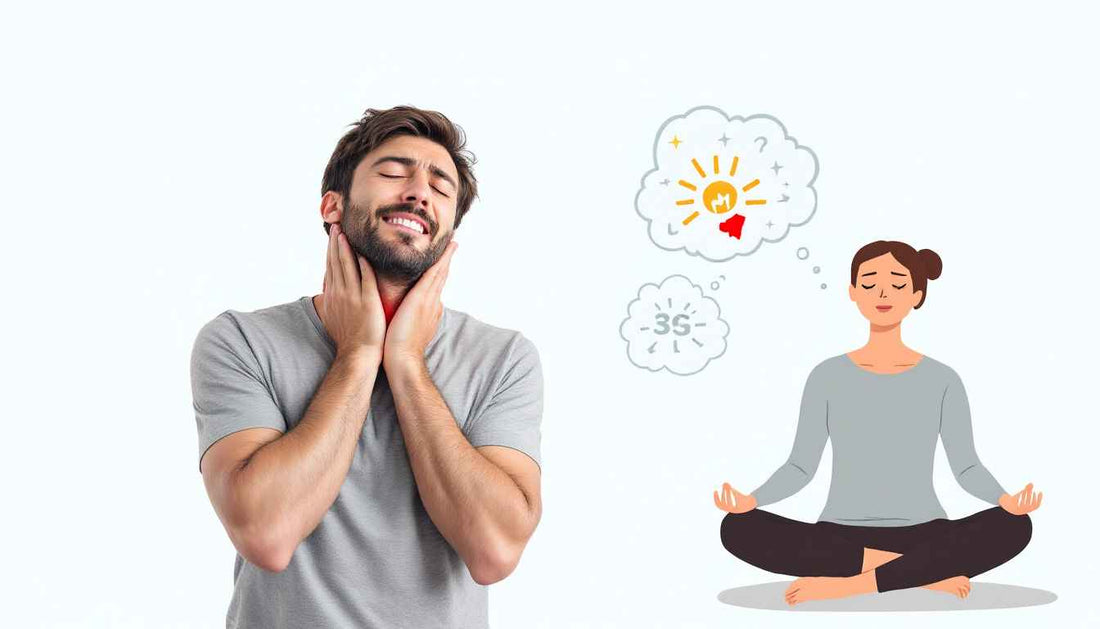
How Stress Triggers Pain (And Hacks to Break the Cycle)
Share
You’re exhausted, your shoulders are tight, and your back won’t stop aching. Sound familiar? That’s not just a bad day — it’s the physiological toll of stress on your body. Modern science confirms what many of us intuitively know: stress and pain are deeply connected.
But here’s the good news — by understanding how stress triggers pain, you can apply powerful, proven hacks to break the cycle and reclaim control over your body.
The Stress-Pain Connection: Why It Hurts
What Happens When You’re Stressed
Stress activates your body’s “fight or flight” response, flooding your system with cortisol and adrenaline. While helpful in short bursts, chronic stress causes muscle tension, inflammation, and nervous system sensitivity — the perfect recipe for persistent pain.
- Muscle tension: Stress causes your muscles to contract, especially around the neck, shoulders, and back.
- Nervous system sensitization: Chronic stress lowers your pain threshold by keeping your nervous system in a hyper-alert state.
- Inflammation: Cortisol dysregulation can increase systemic inflammation, making pain worse.
Conditions Made Worse by Stress
- Migraines and tension headaches
- Fibromyalgia
- IBS (Irritable Bowel Syndrome)
- Temporomandibular joint disorder (TMJ)
- Chronic neck and back pain
✅ Q: Can stress cause physical pain?
A: Yes. Chronic stress triggers muscle tension, inflammation, and increased pain sensitivity, leading to real physical pain in areas like the neck, back, and head.
How Stress Creates a Vicious Cycle of Pain
When stress causes pain, the pain itself creates more stress — and the loop continues. You may:
- Lose sleep, which lowers your pain tolerance.
- Avoid movement, which weakens muscles.
- Ruminate and catastrophize, increasing mental tension.
This creates a self-perpetuating feedback loop. To recover, you need to interrupt the cycle at multiple points — mentally, physically, and emotionally.
7 Proven Hacks to Break the Stress-Pain Cycle
1. Deep Breathing to Calm the Nervous System
Breathing deeply activates the parasympathetic nervous system — your body’s “rest and digest” mode.
- Try This: 4-7-8 Breathing (Inhale for 4 sec, hold 7 sec, exhale 8 sec)
- Why It Works: Lowers heart rate and relaxes tense muscles.
2. Move Your Body (Even When It Hurts)
Gentle movement like yoga, tai chi, or walking increases endorphins — your body’s natural painkillers.
- Pro Tip: Start with 10 minutes per day. Consistency beats intensity.
3. Use Wearable Pain-Relief Devices
Tools like TENS units and compression therapy sleeves offer drug-free relief.
- Try our Wearable TENS Unit or Compression Leg Sleeves to relieve stress-induced tension.
4. Practice Guided Meditation for Pain
Studies show mindfulness reduces pain intensity by changing your perception of pain.
- Try Apps: Insight Timer, Calm, Headspace
- Time: Just 10 minutes per day makes a difference
5. Get Quality Sleep (It’s Non-Negotiable)
Stress and pain disrupt sleep — and poor sleep increases stress and pain.
- Create a bedtime ritual
- Limit blue light exposure
- Try a heated wrap to relax before bed: Smart Heated Muscle Wrap
6. Laugh, Connect, and Touch
Laughter and physical connection release oxytocin, reducing cortisol.
- Hug a loved one
- Watch a funny show
- Join a community or support group
7. Nutritional Support
Stress depletes key nutrients like magnesium and B vitamins.
- Eat whole, anti-inflammatory foods
- Hydrate well
- Consider adaptogens like ashwagandha or Rhodiola (consult your doctor first)
Internal Links
- Read our full guide on The Role of Sleep in Healing Chronic Pain
- Learn Meditation Techniques for Pain Relief
- Discover Top Wearable Devices for Pain-Free Living in 2025
FAQ – People Also Ask
Q: Can emotional stress cause body pain?
A: Absolutely. Emotional stress causes real physical symptoms, including muscle tension, headaches, and digestive issues.
Q: What part of the body is most affected by stress?
A: Common stress-affected areas include the neck, shoulders, back, and head.
Q: How can I relieve pain caused by stress?
A: Use a combination of deep breathing, light movement, wearable devices, sleep optimization, and mindfulness techniques.
Q: Can stress pain mimic other conditions?
A: Yes, stress-related pain can feel like fibromyalgia, arthritis, or even heart conditions. Always consult a doctor to rule out underlying causes.
Final Thoughts: Your Body’s Not Broken — It’s Overwhelmed
Stress-related pain doesn’t mean you’re weak — it means your body’s alarm system is stuck in the “on” position. You have the power to reset it. The right tools, habits, and mindset can break the cycle and bring you lasting relief.
CTA:
👉 Want fast, natural relief from stress-related pain? Explore our collection of Wearable Recovery Tools designed to calm your nervous system and soothe your muscles — without medication.
